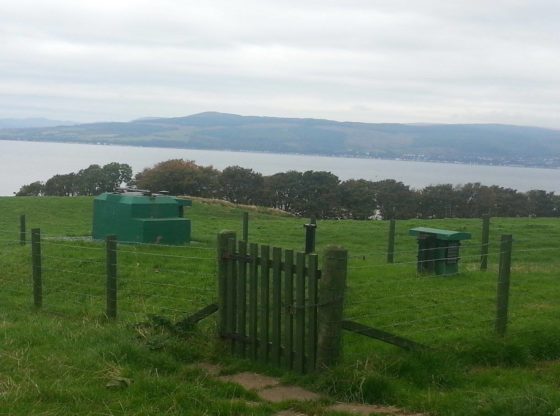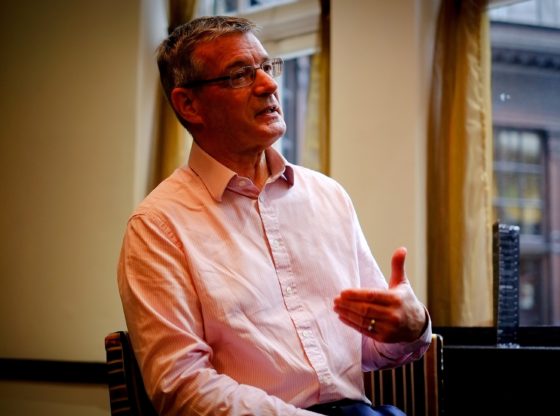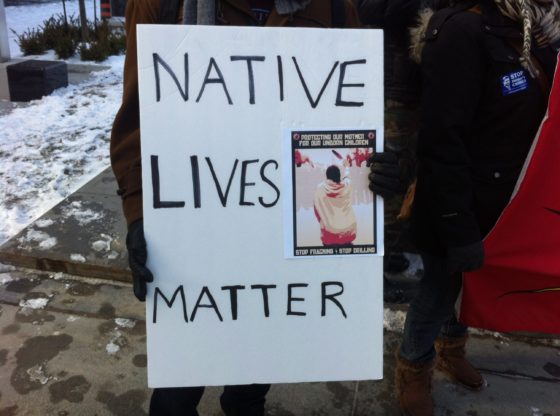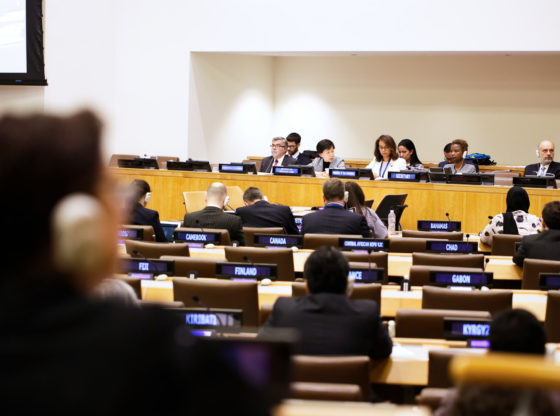How will Brexit impact Scotland’s cultural and creative sectors? In this essay, Andrew Ormston illuminates how individuals from within these communities are responding to Brexit, and details various concerns over what may lie ahead. He contends that bold thinking is required to earmark the brightest future pathways for Scotland’s post-Brexit cultural scene. The imminent Edinburgh Festivals will provide a key platform for discussion.
The cultural and creative sectors are sometimes considered to be relatively volatile and difficult to define. Compared to Brexit, however, they appear as solid as a rock. We know little and can predict even less about what the Brexit train looks like as it comes down the tracks. We don’t even know what speed it is going at, or who is on board. This article should really be a homage to the people tracking events through the ideological snowstorm in an attempt to prepare for whatever the future might hold.
The Scottish Centre for European Relations has been tireless in preparing Brexit briefings on almost a daily basis. They are a ‘go to’ resource for reflection on events as they unfold, and have also maintained a consistent view that “either the UK can stay in the EEA, and respect all four freedoms, or it can have a Canada-style trade deal (with major, negative impacts on UK trade flows to the EU)”. As we observe a general move away from the ‘having the cake and eating it’ view of Brexit, it is clear that the cultural and creative sector must ‘prepare for the worst and hope for the best’.
We know quite a bit about the EU position through the published negotiating papers. There are currently 25 of these briefings on everything from citizen’s rights to judicial cooperation. But culture is not anywhere near top of the agenda when issues such as human rights and economic ruination are at stake. So here we must look to the cultural sector’s institutions, and they have been quite busy.
A survey in the run up to the EU referendum found that 96% of those working in the UK’s creative industries wanted to remain in the EU. Combine this with the Scottish view on leaving Europe and you have a densely formed block of anti-Brexit sentiment. A number of well known figures connected to the sector were signatories to the recent letter to the UK government calling for a rethink on Brexit, published in both the The Herald and the Financial Times. So credit to the professionals and bureaucrats who are putting their feelings to one side, and doing what they can to prepare for our journey into the unknown.
A survey in the run up to the EU referendum found that 96% of those working in the UK’s creative industries wanted to remain in the EU. Combine this with the Scottish view on leaving Europe and you have a densely formed block of anti-Brexit sentiment.
Amidst the admonishments to ‘make the best of it’, and ‘carry on with business as usual’, some serious work is being done to address the realities of a Brexit-defined cultural and creative scene. The British Council presented a set of recommendations under the banner ‘Our Shared European Future’ last month that began with a call for a guarantee on post-Brexit residency rights for EU nationals and for ‘cultural permits’ to allow for ease of movement of cultural professionals between the UK and other EU countries. There is also a particular plea to engage young people in domestic policy development and European exchange.
The Creative Industries Federation has also been looking to shape events with plans for monthly briefings on key issues, a Brexit policy working group and a programme of meetings across the UK, including a national convention in early 2018. The Federation has focused on four areas of concern: talent and skills; EU funding; trade and investment; and regulatory frameworks. The resulting recommendations are a blend of measures to maintain the benefits of EU alignment and the development of new opportunities, all underpinned with increased public sector support for the sector. The degree of sector representation in this work, and its businesslike tone, should make it hard to ignore.
THE VIEW FROM SCOTLAND
Scottish organisations have also been at work. The cultural and creative industries are important to Scotland and worth almost £4 billion to the Scottish economy, with nearly 74,000 employed in the sector and over 15,000 registered enterprises. Europe is also the primary trading partner for Scotland’s cultural goods, surprising those who assume that other English speaking nations are the key markets. Much of the following information has been collated by Creative Scotland whose Chief Executive, Janet Archer, emphasises the need to understand the ‘nuts and bolts’ of Brexit’s likely impact to gauge what will be possible in the future.
This is a daunting task with the great majority of Creative Scotland’s stable of organisations doing some form of international work and most EU investment streams touching on cultural developments. As elsewhere in the UK, the contribution of EU structural funding to the sector’s most significant infrastructure developments isn’t always recognised. Other sub-sectors are also at work. Historic Scotland is examining the legislative position where alignment is crucial to the international movement of collections and in supporting the ease of movement of heritage professionals.
The cultural and creative industries are important to Scotland and worth almost £4 billion to the Scottish economy, with nearly 74,000 employed in the sector and over 15,000 registered enterprises. Europe is also the primary trading partner for Scotland’s cultural goods, surprising those who assume that other English speaking nations are the key markets.
The first port of call for most cultural operators is the EU’s Creative Europe programme which supports the culture and audiovisual sectors across Europe. A survey by the Creative Europe Desk UK found that 87% of respondents supported favoured continued participation in the scheme. The budget for the current 2014-2020 programme is €1.46 billion. Scottish participation was worth €6.3m in 2014/15, involving 16 organisations in every part of the country. Beneficiaries range from established institutions like the Edinburgh International Television Festival and Scottish Documentary Institute to newer initiatives like Imaginate’s PUSH artist development project or UZ Arts focus on emerging talent.
Scotland also figures in new initiatives with Creative Edinburgh and Creative Dundee, forming part of the European Creative Hubs Network. A range of Scottish authors have been translated into other languages with support from the programme. When it comes to moving image, Scotland also has an impressive range of success stories in the Creative Europe MEDIA programme which supports training, audience development, education and distribution. A number of Scottish films have been supported into European circulation, including ’71, Filth, Sunset Song, Under the Skin, Macbeth and Starred Up. In many ways, the current work to quantify the EU funding that has flowed into the wider Scottish cultural sector is less important than the transnational collaboration and exchange that is has supported.
The British Council and others have called for the UK to buy into Creative Europe as well as other programmes that contribute to culture and creativity, including H2020 and Erasmus +. There is plenty of precedence as well as a financial bill for this approach. Norway has access through its European Free Trade Association Membership (EFTA) while countries like Albania or Serbia have access through bilateral agreements with the European Commission.
Reaching agreement with the UK may not be a simple as it seems. Currently, only states can buy into the European programmes, and this means a UK solution. Creative Europe has developed a range of relatively sophisticated investment mechanisms targeting specific priorities like digital skills or SME investment guarantees, and this responds well to Scottish priorities. But its heart is firmly rooted in commitments to transnational collaboration, intercultural dialogue and impacts at the European level. Squaring off these fundamental aims with Brexit is a challenge.
Cathie Boyd, Director of Glasgow-based theatre company Cryptic and the Sonica Festival, is one of Scotland’s most international cultural producers. She works with Creative Europe both through Cryptic and through her role as a Board member of IETM, one of Europe’s largest and most active performing arts networks. She is worried, and is already experiencing a cautious response from European partners towards the involvement of Scottish companies and projects. This is particularly ominous for Sonica, an internationally recognised sonic arts festival that will involve 13 projects in 16 cities in 7 countries (including Austria, Belgium and The Netherlands) this year. Cathie also points to the possibility that a loss of of EU funding may be compounded by reductions in Scotland’s own support for the arts. But it is the increased hurdles to international collaboration and the associated growth in bureaucracy and paperwork that most concern her. This will be a major challenge for smaller organisations and may need a strategic response and increased national support.
Gwilym Gibbons, Chief Executive of Horsecross Arts, also has a list of practical concerns. His non UK European staff are bemused and uneasy. Will major strategic infrastructure projects like his previous assignment, Mareel, be possible without access to EU funds? There may also be knock on effects. For example, if major international conferences move away from Scotland, then large dedicated conference centres will fill the void with the type of mid-scale events that form part of the business plans of larger arts venues like Horsecross. Much attention has been paid to how truly international art forms like opera will fare when singers may experience concert-busting travel barriers. The Creative Industries Federation is making progress on the use of a mechanism called the Permitted Paid Engagement visa to resolve the problem.
These kind of strategic options and practical challenges may be tackled in the emerging Scottish cultural strategy. Leonie Bell has been seconded to the Scottish government to lead this process. Her work may be particularly important to how the cultural sector responds to Brexit given the draining of attention and capacity from the public sector to the negotiating process.
‘A STATE OF CONSIDERABLE FLUX’
This tension between the practical necessities of preparing for Brexit and the commitment of many cultural professionals to international exchange and collaboration is palpable in every conversation. Many in the sector are having to separate their heart and their head. After all, as Janet Archer comments, “we are a generation that grew up thinking we are European”. However, this viewpoint can be awkward for cultural organisations who may feel they must remain politically neutral. Registered charities are required to keep their political viewpoints to themselves. Nick Barley, Director of Edinburgh International Book Festival (EIBF), thinks that both his artists and audiences are overwhelmingly against Brexit. The festival employs a number of talented staff from other EU countries so not taking a position on Brexit feels contrary to the feelings of the festival’s stakeholders.
The UK government has recently said that free movement will end in March 2019. However, even before this announcement, non-UK Europeans appeared to be turning away from the UK. Everyone now seems to have a friend or colleague who has taken up their Irish citizenship, or is applying for citizenship of their spouse’s country. It may be that our most immediate problem lies in losing a skilled workforce through the cultural impact of Brexit. For every story of someone leaving, there is another of someone being harassed or bullied.
Nick Barley’s personal view is that the consequences of Brexit will be deeply effect the UK for a generation, and he feels, keenly, the “reputational bombshell” that is taking effect. EIBF will be playing a role in stimulating debate about what Scotland’s relationship with Europe can be in the future. Both Nick Barley and Joanna Baker (Managing Director of Edinburgh International Festival) point to a renewed duty to the founding spirit of their respective festivals. In 1947 the strong pro-European and anti-war sentiments formed by the horror of World War Two shaped Edinburgh’s festivals, not as a trading zone, but as a zone of peacemaking. There is some evidence of these values being revisited as ‘remainers’ become less timid about their stance on Europe. Events may be bringing out the internationalist in us. Nick Barley points to the commitment of Scottish publishers to publish more translated work as one significant indicator.
It may be that our most immediate problem lies in losing a skilled workforce through the cultural impact of Brexit. For every story of someone leaving, there is another of someone being harassed or bullied.
These sentiments are reciprocated across Europe. A senior EU official commented last week, when discussing plans for next year’s European Year of Cultural Heritage, that Brexit “feels like losing one of the family”. Her view that this may be felt more keenly in the cultural and heritage sectors was, however, quickly followed with the observation that “when a child wants to leave you, have to let them go”, thus reflecting how the show is now moving on in Europe.
The UK Government published the Industrial Strategy green paper in January 2017, with the creative industries established as one of five priority areas for growth. The Creative Industries Federation have been one of the leading voices in securing an undertaking from Government to move quickly concerning this element of the plan. However, the challenges presented by moving outside the EU Single Market are formidable in this area and are likely to be most acutely felt by smaller organisations. Co-productions that spread risk and increase access to investment are going to be more difficult, and there are reports that producers and artists are becoming reluctant to sign contracts for sterling transactions with so much fluctuation in its value.
The UK is a major force in European broadcasting and moving image production. Almost a third of Europe’s television channels which target other EU countries, and a fifth of on-demand and catch-up services, are based in the UK. The UK has been a major beneficiary of EU MEDIA investment, with the funding playing an important role at every level of the sector, from start ups to major productions. The sector has not been shy in voicing its worries over future investment.
In 1947 the strong pro-European and anti-war sentiments formed by the horror of World War Two shaped Edinburgh’s festivals, not as a trading zone, but as a zone of peacemaking. There is some evidence of these values being revisited as ‘remainers’ become less timid about their stance on Europe. Events may be bringing out the internationalist in us.
When it comes to the wider digital environment, the UK is 7th in the European league table (DESI17) on digitalisation, scoring poorly on the use of electronic information sharing, integration of digital technologies, and super fast broadband. There is clearly much to do, as online users in Scotland’s rural communities know all too well. A UK Digital Strategy policy paper was published in March 2017 and included ambitions concerning skills development and markets. However, it was noted that the paper lacked concrete detail on how to move forward.
This is an area where the view west from Glasgow’s Pacific Quay and east from Edinburgh are radically different. The US appears to be abandoning net neutrality while the EU considers online access as a citizen’s right. With Brexit, the UK has the option of choosing between the two. What happens to our ideas-based creative economy if we choose the former and exclude some of our brightest talents from the full digital offer? There is also the question of whether the relative dominance of the US in these markets creates a monoculture, and a ‘less European’ UK, that would be less attractive as a base for internationally-minded ‘creatives’.
The creation of the European Digital Single Market (DSM) is estimated to add €415 billion to the European economy. Some commentators suggest that if the UK leaves the Digital Single Market, Scottish companies may have to re-locate their headquarters to an EU member state. Content produced in Scotland would not be considered of ‘European origin’ for major service providers like Netflix. Scotland would also not be included in the EU-negotiated agreements that directly impact the audio-visual services sectors (GATT and GATS), making areas like film subsidies, tax credits, and subsidy of public sector broadcasting open to challenge. This is important to those exploring the post-Brexit opportunity to increase government incentives like tax credits with the removal of EU State Aid rules.
Content produced in Scotland would not be considered of ‘European origin’ for major service providers like Netflix.
The Scottish government and its agencies are working hard to prepare for what lies ahead. They are using the recently established hubs in Berlin, Brussels, and Dublin, and communicating ideas and practical suggestions to the EU. Recent bilateral discussions with the Welsh government resulted in a potent joint statement declaring that they could not support the Great Repeal Bill. The creative industries are also an area where Scotland shares strong interests with Ireland.
However, to quote Nick Barley once again, “we are in a state of considerable flux”. The problem facing those trying to lobby and prepare for Brexit is that the institutional foundations on which the arts and culture sector operates may also be shape-shifting. For example, if the repatriation of EU powers in the Great Repeal Bill prompts a significant change to Westminster’s approach to devolution, then this will impact on a sector that is largely devolved to the Scottish government.
But flux is a state that cultural and creative practitioners are very familiar with. The Edinburgh International Book Festival takes pride in an event where people come to debate in a ‘less rigid way’, and may potentially change their minds. It is the opposite of a rally where everyone knows their position. Gwilym Gibbons, currently Chief Executive of Horsecross Arts in Perth, lived and worked in Shetland for eight years, where the cultural community saw “the sea as a way to connect; the sea as a highway of ideas”. He thinks that the cultural sector has a particular role to play in stimulating and maintaining the flow of ideas between Scotland and Europe. The ‘sparky’ cultural identity of ‘cool Britannia’ owes much to international dialogue and a multi-cultural energy. It wasn’t so long ago that the UK had a deserved international reputation for creative multiculturalism in almost every area of the cultural sector. The cultural sector is good at responding to adversity, change and challenges. Gibbons wonders whether new opportunities will open up to engage with Europe separately from existing governmental structures and networks in a kind of creative global citizenship.
There can be no better opportunity than the imminent Edinburgh Festivals to debate and progress the many issues raised for the cultural and creative sector by Brexit. The Edinburgh International Festival rests on a commitment to dialogue with ‘the other’. The Festival’s 70th anniversary is likely to be particularly important at a time when internationalism has become something of a dirty word. Edinburgh’s International Festival and its Book Festival will reinvigorate the values that will hopefully underpin the Scotland’s post-Brexit cultural scene. Most of us are also looking forward to what the Fringe has to say about it.
Andrew Ormston is an international consultant and expert with extensive experience in strategic leadership, project development and review across the cultural and creative industries. Prior to this, he worked as director of culture for the municipalities of Birmingham, Reading and a Central London Borough. Andrew has also managed a number of venues, festivals and arts development projects. Active research interests include interdisciplinary projects, qualitative evaluation and research, international cultural policy, and creativity as a tool that empowers young people. Andrew is an Honorary Fellow of the School of Social and Political Science at Edinburgh University, a Fellow of the Royal Society for the Arts, and a Board member of NN Contemporary Arts, Berwick Film & Media Arts Festival and SURF: Scotland’s Regeneration Network.
Feature image: Edinburgh International Festival fireworks, 2014. Image: Marsupium photograph [CC BY-SA 2.0]











